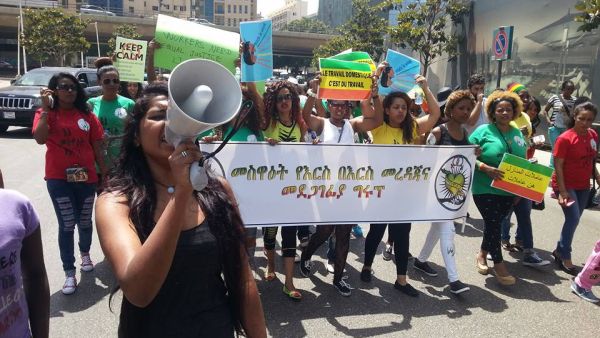Reignited by the current global movement demanding better rights for blacks in the wake of George Floyd's killing by the US police, the conversation over abuse experienced by people of African origin has made it to Middle Eastern platforms.
For decades, foreign workers in Lebanon and many other countries have reported human rights abuses, ones with legal and social roots.
According to Human Rights Watch, more than 250k individuals have been working in Lebanon, mostly as domestic workers.
Many women from the Philippines, Sri Lanka, Ethiopia, Nigeria, Bangladesh, and other countries have for decades suffered from social and racial prejudice promoted and maintained by the Kafala "sponsorship" system.
Per Lebanese laws, migrant workers can only be allowed to reside in the country when sponsored by a Lebanese citizen. Also, the law denies these workers the right to resign unless their sponsor, who is their employer in most cases lets them go, Amnesty International states.
Thousands of Ethiopians want to go home. If Ethiopian government doesn't lower expensive flight and quarantine price, more Ethiopian women will be abandoned, harassed sold! @mfaethiopia @flyethiopian pic.twitter.com/5yAlDzNLq5
— Banchi Yimer (@BanchiELB) June 7, 2020
This law overlooks the fact that most resigning workers do so pressured by different forms of abuse they suffer at the hands of their employers, which puts them in a more vulnerable place and "facilitates forced labor."
Additionally, most domestic workers are denied the right to bring their immediate family members to live with them, not even infant children, adding to the distress and sorrow they go through.
In Lebanon and other Middle Eastern countries, migrant workers are stripped from their passports as soon as they arrive. Employers and sponsors argue that this practice is the best guarantee that they will not run off or misuse their residency in the country.
In addition to violence, sexual harassment, many foreign workers report being denied all forms of communication with their families back home. Even more startling, many couldn't reveal being denied their salaries until "they were set free."
Human rights and labor groups have for years called on Lebanese authorities to abolish such labor laws deemed as modern-day slavery, but no action has been taken yet.
Recently, migrant workers in Lebanon have been under a lot of pressure especially following deteriorating economic conditions in Lebanon, which got only worse after the Coronavirus outbreak three months ago.
Last April, 23-year old-Ghanian Faustina Tay was found dead after 18 hours of sending a message to a local activist group calling for help amid violence and abuse she had been experiencing at the hands of her employer, stirring a lot of controversy over domestic workers' rights in the country.
Tay is only one of the tens of migrant workers, who have lost their lives in Lebanon to either suicide or homicide by employers, during the last few years.
After being laid off by employers, who have lost the financial ability to hire them in the recent months, domestic workers have been protesting in front of their embassies in Beirut calling on their governments to help them fly home.
#Lebanon
— Luna Safwan - لونا صفوان (@LunaSafwan) May 23, 2020
I just spent sometime with these amazing Ethiopian ladies protesting in front of the Ethiopian embassy in Hazmieh on behalf of all migrant workers here.
They want to return to #Ethiopia but their embassy is not being cooperative or transparent with them. #COVIDー19 pic.twitter.com/NNJqcVkONJ
Similar to many other Arab countries with the Kafala system, different facets of injustice aren't limited to laws that enable sponsors to exploit workers but can also be extended to the social and racial prejudice they suffer from.
In addition to discriminatory laws against Palestinians and Syrian refugees in the country, the Lebanese environmental, cultural, and social activist organization IndyAct reported in 2010 that multiple swimming pools and nightclubs had signs that explicitly banned people of color from entering, including tourists from the US and Europe.
Due to the large population of Lebanese people living in several West African countries over the last 40 years, especially in Nigeria, Ghana, and Senegal, there have been two or three generations of African Lebanese people who experience discrimination on the base of their race.
زينب كنعان | لبنانية-إفريقية: السود هنا بينكم ولا أريد شفقتكم.. أريد حقيhttps://t.co/4EsadwkXay
— Al Modon (@almodononline) June 3, 2020
Translation: "Zeinab Kanaan is an African-Lebanese: Black sare here amongst you. I don't need your pity, I demand my rights."
An overwhelming number of Lebanese social media posts supporting the Black Lives Matter has urged many Black Lebanese to point out the hypocrisy in endorsing the movement calling for black rights in the US and western countries while totally ignoring the clear racism in Lebanon.







